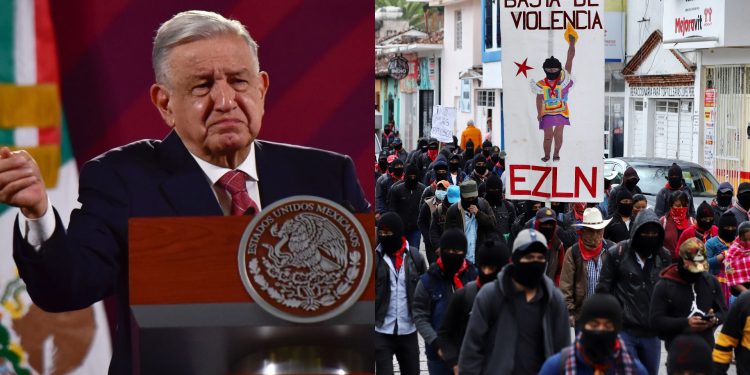CHIAPAS – There are 17 months remaining in the government of Andrés Manuel López Obrador, the current president of Mexico. Since his arrival in the presidential chair, the winds of change blew strongly, and it is not for less, the mega-projects of big capital that previous governments could not push, he is carrying out at an impressive speed. But, in this game, there are winners and losers, among them, the peoples that resist the subjugation of the new wave of capitalist capitalist painted as sustainable, such as the Zapatista autonomous communities where paramilitary attacks have become more acute.
Just a few days ago, while the demand for an end to the war in Zapatista communities was being sung in 72 corners of the planet in one voice, the indigenous Zapatista support base, Jorge López Sántiz, suffered the aftermath of a bullet wound that left wounds in the intestine. Organizations from Mexico and the world denounced that the attacks came from the paramilitary group Regional Organization of Coffee Growers of Ocosingo (ORCAO), created during the government of the Institutional Revolutionary Party (PRI).
Although the protests resounded in different news spaces, more than 800 detonations of firearms continued to impact houses, schools and autonomous clinics, in addition to the burning of the plots where the support base families of the Zapatista Army of Liberation work. National (EZLN).
“From June 19 to 22, this paramilitary group continued to siege the Zapatista support bases. With the consent or inaction of the three levels of government, they have sought to escalate the war by attacking with firearms in a continuous and coordinated manner in three Zapatista towns: Emiliano Zapata, San Isidro and Moisés y Gandhi, located in the municipality of Ocosingo, Chiapas”, denounced hundreds of organizations and individuals that make up the National Coordination Space Stop the war against the Zapatista peoples, if they touch one, they touch us all.
This Coordination points out that the attacks are part of a paramilitary war strategy against the Zapatista movement since it emerged in 1994, when the North American Free Trade Agreement (NAFTA) was signed. “Now they are framed in a context of increasing violence, fostered by the economic crisis in which the non-Zapatista peoples live; without more resources, dependent and subordinate to the benefits of social programs such as Sembrando Vida. Non-Zapatista towns find themselves in the need to exchange money for hectares of land, which has led paramilitary organizations such as the ORCAO to carry out more than 100 attacks from 2019 to date in order to dispossess territories”, highlights this group of communities by communication.
AMLO denies paramilitary violence
Despite the constant denunciations during Obrador’s term, at the press conference he held in the state of Chiapas on June 23, he tenaciously assured that “there are leaders of civil society, including organizations that defend human rights humans who do not see us with good eyes”, without mentioning anything relevant about the paramilitary attacks against the Zapatista communities.
AMLO assured that he was not “Salinas” (referring to Carlos Salinas de Gortari, former president of Mexico in 1994), and also said “I am not Zedillo, I am not Fox, I am not Calderón” referring to the ex-presidents who presided over him.
Obrador reaffirmed that he is the Supreme Commander of the Armed Forces, “so I will never give the order to repress the people, I will never give the order to massacre the people, to torture the people, to violate human rights.”
In addition, he stressed that his social policies have helped “because in programs like Sembrando Vida there are reunions of those who were confronted, everyone participates. Because there was a lot of division below. So, little by little, unity has been achieved and we will continue to do so, respecting everyone, but also informing and clarifying things”.
The communities that have expressed their solidarity with the Zapatista movement expressed their concern after the statements by the Mexican president, in addition, “this attitude not only seems alarming to us, we are concerned that it could be the preamble to an even greater physical and/or media attack. Minimizing violence encourages paramilitary groups by covering them with the cloak of impunity”.
Civil Society Organizations were also on alert, “we express our concern and regret the defamation against Civil Society and Human Rights organizations in Chiapas,” said the Fray Bartolomé de Las Casas Human Rights Center. (CDH Frayba), since they consider that their work is violated in the midst of this context of paramilitary violence, used according to this organization “for social, political, economic, and territorial control, marked by the continuity of generalized violence and a counterinsurgency strategy.
The attacks
From June 19 to 21, the armed group again took action against the Zapatista communities, nearly 800 detonations of high and low caliber firearms in three days, as well as burning the plots where the EZLN Support Base families work. .
Frayba has recorded that since AMLO came to power to date, more than 110 armed attacks have been perpetrated against Zapatista autonomous communities. “These attacks have included the burning of schools and coffee warehouses, armed attacks, torture, kidnappings, and serious injuries with firearms, which have been denounced by the Zapatista peoples and documented by Frayba,” notes this human rights organization.
This organization, based in Chiapas, firmly maintains that those who have perpetrated these attacks are part of the governmental structure of the municipality of Ocosingo governed by the Green Ecologist Party of Mexico, who are the ones who channel the resources of the federal government’s social programs, like Sowing Life.
Contrary to what the President of the Mexican Republic maintains, these programs “in Chiapas territory have generated conflicts and tensions, confronting those who fight for control from the right to autonomy and self-determination and those who seek to access land resources through starting from state control and territorial reconfiguration, with land management, alien to the needs of the original peoples”.




